ENTREPRENEURSHIP REPORT: Ventures, Statistics, and Entrepreneurship
VerifiedAdded on 2023/01/11
|17
|5720
|36
Report
AI Summary
This report provides a comprehensive overview of entrepreneurship and small business management. It begins by defining entrepreneurial ventures, differentiating various types such as small businesses, large companies, and social enterprises, and exploring typologies like lifestyle enterprises and high-growth ventures. The report then compares these ventures, highlighting similarities and differences. A key focus is the interpretation of statistics to demonstrate the impact of micro, small, and medium-sized businesses on the economy, both locally and nationally. The report further examines the role of small businesses and start-ups in fostering social and economic growth. It also delves into the characteristics, traits, and skills of successful entrepreneurs, exploring the influence of personality and motivation. Finally, the report considers how entrepreneurs' backgrounds and experiences can either facilitate or hinder their entrepreneurial endeavors. The report concludes with a summary of the key findings and insights into the dynamic world of entrepreneurship.

ENTREPRENEURSHIP
AND SMALL BUSINESS
MANAGEMENT
AND SMALL BUSINESS
MANAGEMENT
Paraphrase This Document
Need a fresh take? Get an instant paraphrase of this document with our AI Paraphraser
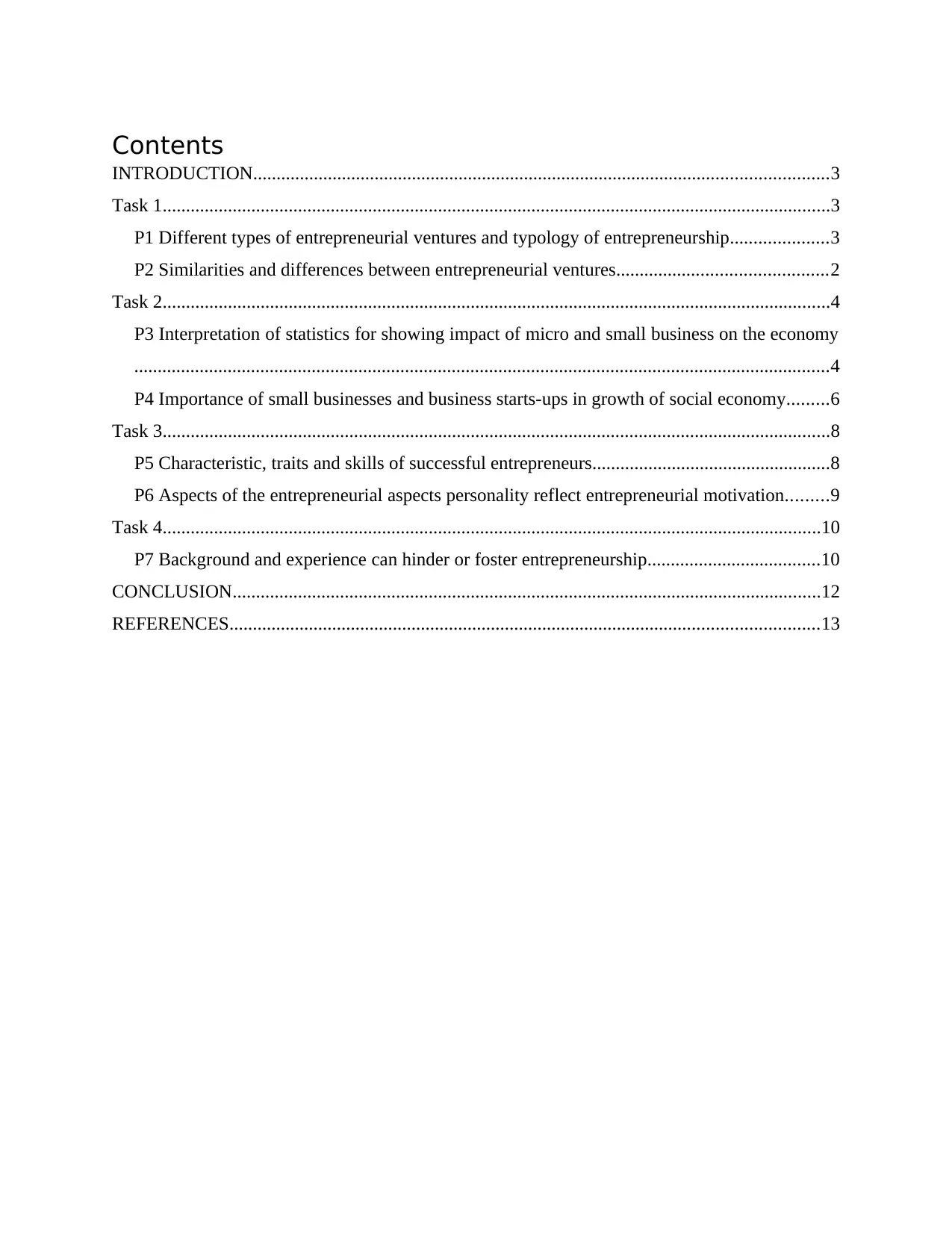
Contents
INTRODUCTION...........................................................................................................................3
Task 1...............................................................................................................................................3
P1 Different types of entrepreneurial ventures and typology of entrepreneurship.....................3
P2 Similarities and differences between entrepreneurial ventures.............................................2
Task 2...............................................................................................................................................4
P3 Interpretation of statistics for showing impact of micro and small business on the economy
.....................................................................................................................................................4
P4 Importance of small businesses and business starts-ups in growth of social economy.........6
Task 3...............................................................................................................................................8
P5 Characteristic, traits and skills of successful entrepreneurs...................................................8
P6 Aspects of the entrepreneurial aspects personality reflect entrepreneurial motivation.........9
Task 4.............................................................................................................................................10
P7 Background and experience can hinder or foster entrepreneurship.....................................10
CONCLUSION..............................................................................................................................12
REFERENCES..............................................................................................................................13
INTRODUCTION...........................................................................................................................3
Task 1...............................................................................................................................................3
P1 Different types of entrepreneurial ventures and typology of entrepreneurship.....................3
P2 Similarities and differences between entrepreneurial ventures.............................................2
Task 2...............................................................................................................................................4
P3 Interpretation of statistics for showing impact of micro and small business on the economy
.....................................................................................................................................................4
P4 Importance of small businesses and business starts-ups in growth of social economy.........6
Task 3...............................................................................................................................................8
P5 Characteristic, traits and skills of successful entrepreneurs...................................................8
P6 Aspects of the entrepreneurial aspects personality reflect entrepreneurial motivation.........9
Task 4.............................................................................................................................................10
P7 Background and experience can hinder or foster entrepreneurship.....................................10
CONCLUSION..............................................................................................................................12
REFERENCES..............................................................................................................................13
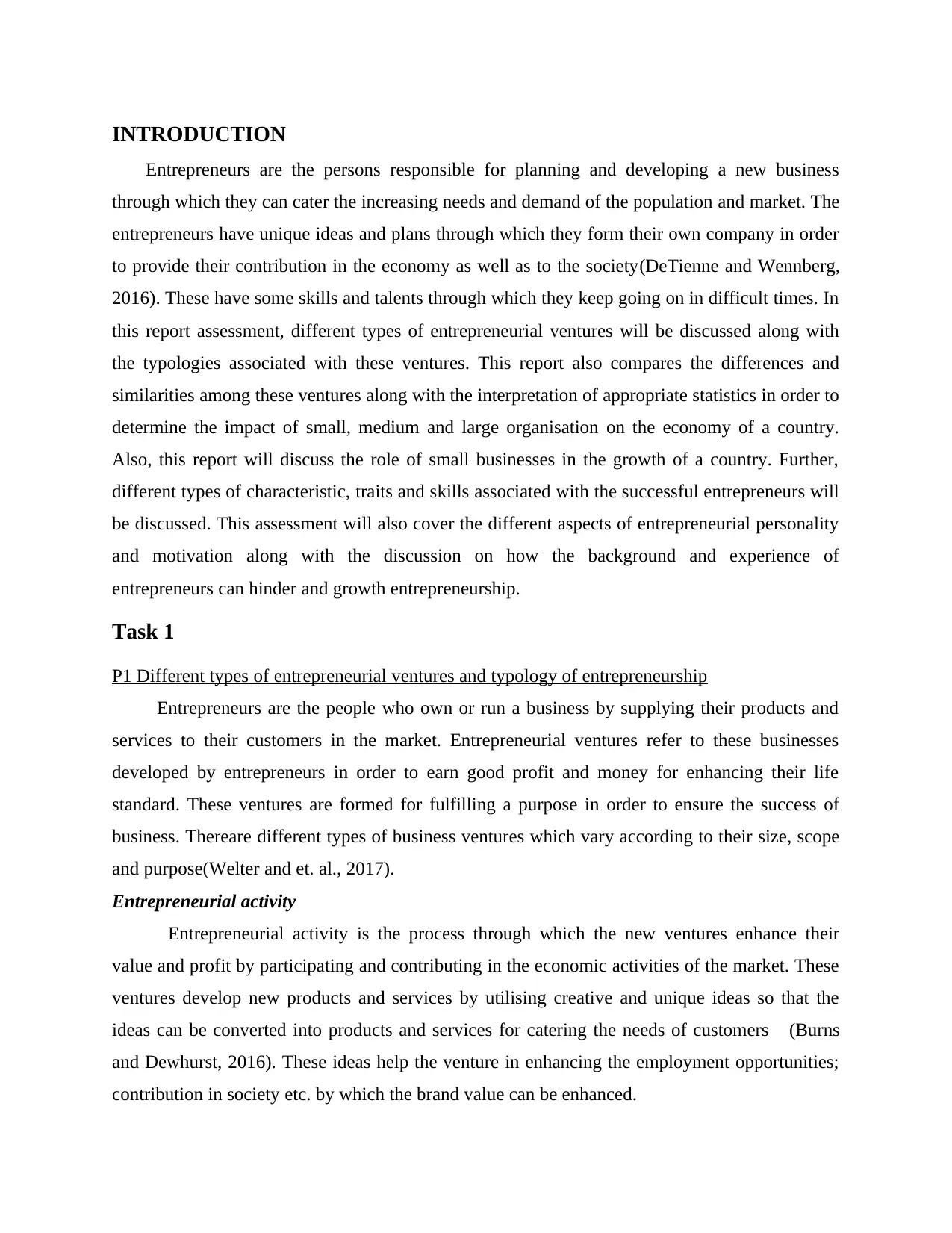
INTRODUCTION
Entrepreneurs are the persons responsible for planning and developing a new business
through which they can cater the increasing needs and demand of the population and market. The
entrepreneurs have unique ideas and plans through which they form their own company in order
to provide their contribution in the economy as well as to the society(DeTienne and Wennberg,
2016). These have some skills and talents through which they keep going on in difficult times. In
this report assessment, different types of entrepreneurial ventures will be discussed along with
the typologies associated with these ventures. This report also compares the differences and
similarities among these ventures along with the interpretation of appropriate statistics in order to
determine the impact of small, medium and large organisation on the economy of a country.
Also, this report will discuss the role of small businesses in the growth of a country. Further,
different types of characteristic, traits and skills associated with the successful entrepreneurs will
be discussed. This assessment will also cover the different aspects of entrepreneurial personality
and motivation along with the discussion on how the background and experience of
entrepreneurs can hinder and growth entrepreneurship.
Task 1
P1 Different types of entrepreneurial ventures and typology of entrepreneurship
Entrepreneurs are the people who own or run a business by supplying their products and
services to their customers in the market. Entrepreneurial ventures refer to these businesses
developed by entrepreneurs in order to earn good profit and money for enhancing their life
standard. These ventures are formed for fulfilling a purpose in order to ensure the success of
business. Thereare different types of business ventures which vary according to their size, scope
and purpose(Welter and et. al., 2017).
Entrepreneurial activity
Entrepreneurial activity is the process through which the new ventures enhance their
value and profit by participating and contributing in the economic activities of the market. These
ventures develop new products and services by utilising creative and unique ideas so that the
ideas can be converted into products and services for catering the needs of customers (Burns
and Dewhurst, 2016). These ideas help the venture in enhancing the employment opportunities;
contribution in society etc. by which the brand value can be enhanced.
Entrepreneurs are the persons responsible for planning and developing a new business
through which they can cater the increasing needs and demand of the population and market. The
entrepreneurs have unique ideas and plans through which they form their own company in order
to provide their contribution in the economy as well as to the society(DeTienne and Wennberg,
2016). These have some skills and talents through which they keep going on in difficult times. In
this report assessment, different types of entrepreneurial ventures will be discussed along with
the typologies associated with these ventures. This report also compares the differences and
similarities among these ventures along with the interpretation of appropriate statistics in order to
determine the impact of small, medium and large organisation on the economy of a country.
Also, this report will discuss the role of small businesses in the growth of a country. Further,
different types of characteristic, traits and skills associated with the successful entrepreneurs will
be discussed. This assessment will also cover the different aspects of entrepreneurial personality
and motivation along with the discussion on how the background and experience of
entrepreneurs can hinder and growth entrepreneurship.
Task 1
P1 Different types of entrepreneurial ventures and typology of entrepreneurship
Entrepreneurs are the people who own or run a business by supplying their products and
services to their customers in the market. Entrepreneurial ventures refer to these businesses
developed by entrepreneurs in order to earn good profit and money for enhancing their life
standard. These ventures are formed for fulfilling a purpose in order to ensure the success of
business. Thereare different types of business ventures which vary according to their size, scope
and purpose(Welter and et. al., 2017).
Entrepreneurial activity
Entrepreneurial activity is the process through which the new ventures enhance their
value and profit by participating and contributing in the economic activities of the market. These
ventures develop new products and services by utilising creative and unique ideas so that the
ideas can be converted into products and services for catering the needs of customers (Burns
and Dewhurst, 2016). These ideas help the venture in enhancing the employment opportunities;
contribution in society etc. by which the brand value can be enhanced.
⊘ This is a preview!⊘
Do you want full access?
Subscribe today to unlock all pages.

Trusted by 1+ million students worldwide
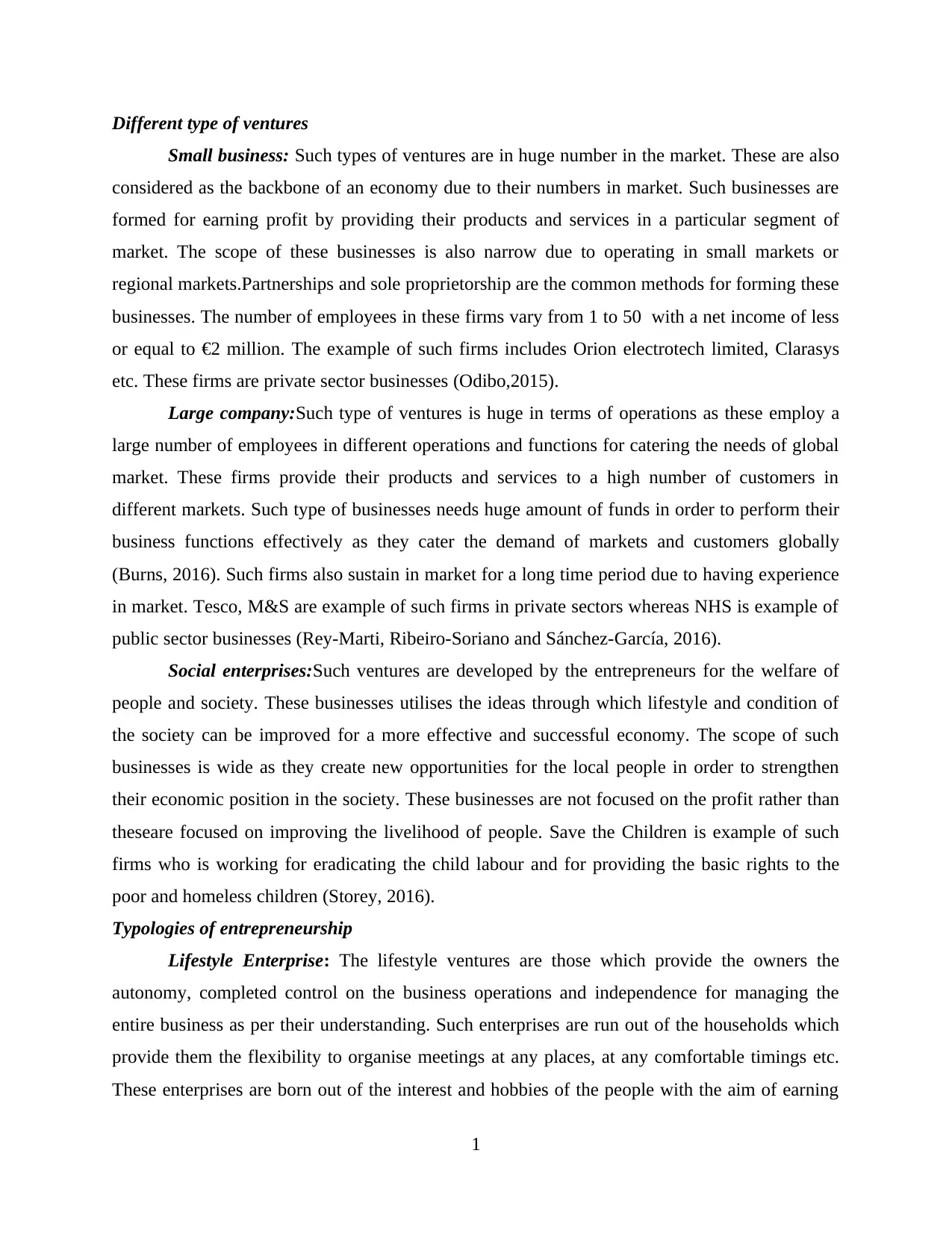
Different type of ventures
Small business: Such types of ventures are in huge number in the market. These are also
considered as the backbone of an economy due to their numbers in market. Such businesses are
formed for earning profit by providing their products and services in a particular segment of
market. The scope of these businesses is also narrow due to operating in small markets or
regional markets.Partnerships and sole proprietorship are the common methods for forming these
businesses. The number of employees in these firms vary from 1 to 50 with a net income of less
or equal to €2 million. The example of such firms includes Orion electrotech limited, Clarasys
etc. These firms are private sector businesses (Odibo,2015).
Large company:Such type of ventures is huge in terms of operations as these employ a
large number of employees in different operations and functions for catering the needs of global
market. These firms provide their products and services to a high number of customers in
different markets. Such type of businesses needs huge amount of funds in order to perform their
business functions effectively as they cater the demand of markets and customers globally
(Burns, 2016). Such firms also sustain in market for a long time period due to having experience
in market. Tesco, M&S are example of such firms in private sectors whereas NHS is example of
public sector businesses (Rey-Marti, Ribeiro-Soriano and Sánchez-García, 2016).
Social enterprises:Such ventures are developed by the entrepreneurs for the welfare of
people and society. These businesses utilises the ideas through which lifestyle and condition of
the society can be improved for a more effective and successful economy. The scope of such
businesses is wide as they create new opportunities for the local people in order to strengthen
their economic position in the society. These businesses are not focused on the profit rather than
theseare focused on improving the livelihood of people. Save the Children is example of such
firms who is working for eradicating the child labour and for providing the basic rights to the
poor and homeless children (Storey, 2016).
Typologies of entrepreneurship
Lifestyle Enterprise: The lifestyle ventures are those which provide the owners the
autonomy, completed control on the business operations and independence for managing the
entire business as per their understanding. Such enterprises are run out of the households which
provide them the flexibility to organise meetings at any places, at any comfortable timings etc.
These enterprises are born out of the interest and hobbies of the people with the aim of earning
1
Small business: Such types of ventures are in huge number in the market. These are also
considered as the backbone of an economy due to their numbers in market. Such businesses are
formed for earning profit by providing their products and services in a particular segment of
market. The scope of these businesses is also narrow due to operating in small markets or
regional markets.Partnerships and sole proprietorship are the common methods for forming these
businesses. The number of employees in these firms vary from 1 to 50 with a net income of less
or equal to €2 million. The example of such firms includes Orion electrotech limited, Clarasys
etc. These firms are private sector businesses (Odibo,2015).
Large company:Such type of ventures is huge in terms of operations as these employ a
large number of employees in different operations and functions for catering the needs of global
market. These firms provide their products and services to a high number of customers in
different markets. Such type of businesses needs huge amount of funds in order to perform their
business functions effectively as they cater the demand of markets and customers globally
(Burns, 2016). Such firms also sustain in market for a long time period due to having experience
in market. Tesco, M&S are example of such firms in private sectors whereas NHS is example of
public sector businesses (Rey-Marti, Ribeiro-Soriano and Sánchez-García, 2016).
Social enterprises:Such ventures are developed by the entrepreneurs for the welfare of
people and society. These businesses utilises the ideas through which lifestyle and condition of
the society can be improved for a more effective and successful economy. The scope of such
businesses is wide as they create new opportunities for the local people in order to strengthen
their economic position in the society. These businesses are not focused on the profit rather than
theseare focused on improving the livelihood of people. Save the Children is example of such
firms who is working for eradicating the child labour and for providing the basic rights to the
poor and homeless children (Storey, 2016).
Typologies of entrepreneurship
Lifestyle Enterprise: The lifestyle ventures are those which provide the owners the
autonomy, completed control on the business operations and independence for managing the
entire business as per their understanding. Such enterprises are run out of the households which
provide them the flexibility to organise meetings at any places, at any comfortable timings etc.
These enterprises are born out of the interest and hobbies of the people with the aim of earning
1
Paraphrase This Document
Need a fresh take? Get an instant paraphrase of this document with our AI Paraphraser
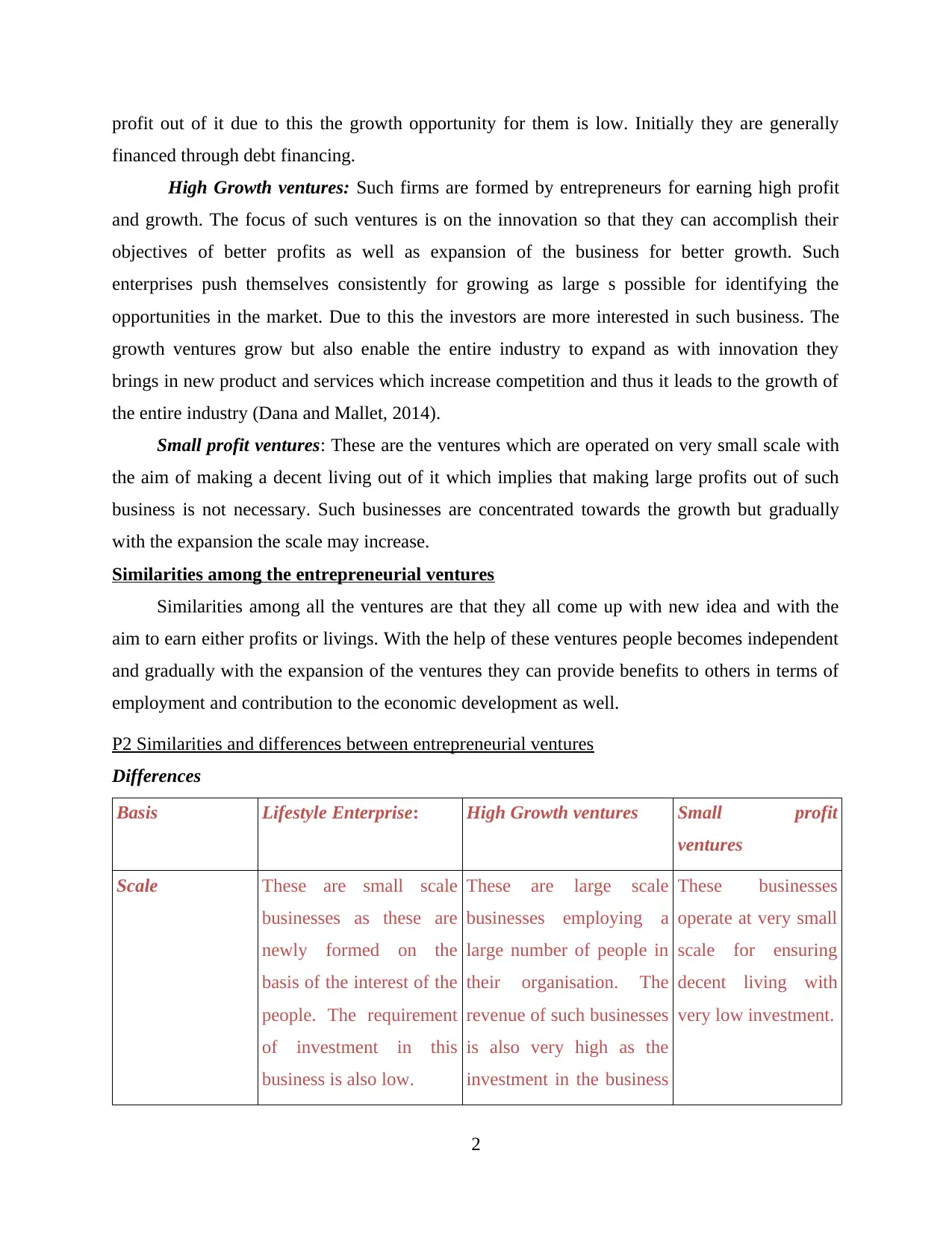
profit out of it due to this the growth opportunity for them is low. Initially they are generally
financed through debt financing.
High Growth ventures: Such firms are formed by entrepreneurs for earning high profit
and growth. The focus of such ventures is on the innovation so that they can accomplish their
objectives of better profits as well as expansion of the business for better growth. Such
enterprises push themselves consistently for growing as large s possible for identifying the
opportunities in the market. Due to this the investors are more interested in such business. The
growth ventures grow but also enable the entire industry to expand as with innovation they
brings in new product and services which increase competition and thus it leads to the growth of
the entire industry (Dana and Mallet, 2014).
Small profit ventures: These are the ventures which are operated on very small scale with
the aim of making a decent living out of it which implies that making large profits out of such
business is not necessary. Such businesses are concentrated towards the growth but gradually
with the expansion the scale may increase.
Similarities among the entrepreneurial ventures
Similarities among all the ventures are that they all come up with new idea and with the
aim to earn either profits or livings. With the help of these ventures people becomes independent
and gradually with the expansion of the ventures they can provide benefits to others in terms of
employment and contribution to the economic development as well.
P2 Similarities and differences between entrepreneurial ventures
Differences
Basis Lifestyle Enterprise: High Growth ventures Small profit
ventures
Scale These are small scale
businesses as these are
newly formed on the
basis of the interest of the
people. The requirement
of investment in this
business is also low.
These are large scale
businesses employing a
large number of people in
their organisation. The
revenue of such businesses
is also very high as the
investment in the business
These businesses
operate at very small
scale for ensuring
decent living with
very low investment.
2
financed through debt financing.
High Growth ventures: Such firms are formed by entrepreneurs for earning high profit
and growth. The focus of such ventures is on the innovation so that they can accomplish their
objectives of better profits as well as expansion of the business for better growth. Such
enterprises push themselves consistently for growing as large s possible for identifying the
opportunities in the market. Due to this the investors are more interested in such business. The
growth ventures grow but also enable the entire industry to expand as with innovation they
brings in new product and services which increase competition and thus it leads to the growth of
the entire industry (Dana and Mallet, 2014).
Small profit ventures: These are the ventures which are operated on very small scale with
the aim of making a decent living out of it which implies that making large profits out of such
business is not necessary. Such businesses are concentrated towards the growth but gradually
with the expansion the scale may increase.
Similarities among the entrepreneurial ventures
Similarities among all the ventures are that they all come up with new idea and with the
aim to earn either profits or livings. With the help of these ventures people becomes independent
and gradually with the expansion of the ventures they can provide benefits to others in terms of
employment and contribution to the economic development as well.
P2 Similarities and differences between entrepreneurial ventures
Differences
Basis Lifestyle Enterprise: High Growth ventures Small profit
ventures
Scale These are small scale
businesses as these are
newly formed on the
basis of the interest of the
people. The requirement
of investment in this
business is also low.
These are large scale
businesses employing a
large number of people in
their organisation. The
revenue of such businesses
is also very high as the
investment in the business
These businesses
operate at very small
scale for ensuring
decent living with
very low investment.
2
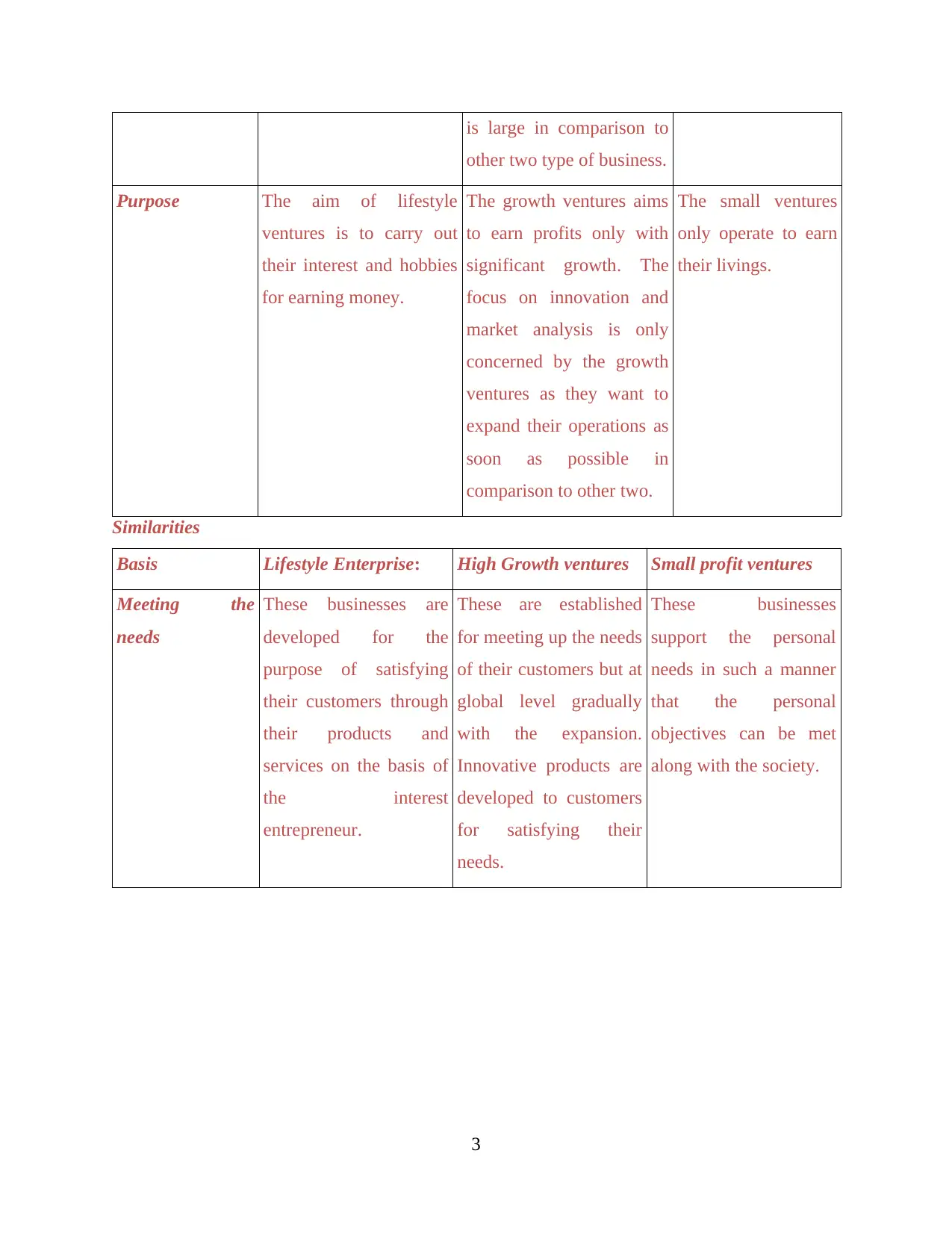
is large in comparison to
other two type of business.
Purpose The aim of lifestyle
ventures is to carry out
their interest and hobbies
for earning money.
The growth ventures aims
to earn profits only with
significant growth. The
focus on innovation and
market analysis is only
concerned by the growth
ventures as they want to
expand their operations as
soon as possible in
comparison to other two.
The small ventures
only operate to earn
their livings.
Similarities
Basis Lifestyle Enterprise: High Growth ventures Small profit ventures
Meeting the
needs
These businesses are
developed for the
purpose of satisfying
their customers through
their products and
services on the basis of
the interest
entrepreneur.
These are established
for meeting up the needs
of their customers but at
global level gradually
with the expansion.
Innovative products are
developed to customers
for satisfying their
needs.
These businesses
support the personal
needs in such a manner
that the personal
objectives can be met
along with the society.
3
other two type of business.
Purpose The aim of lifestyle
ventures is to carry out
their interest and hobbies
for earning money.
The growth ventures aims
to earn profits only with
significant growth. The
focus on innovation and
market analysis is only
concerned by the growth
ventures as they want to
expand their operations as
soon as possible in
comparison to other two.
The small ventures
only operate to earn
their livings.
Similarities
Basis Lifestyle Enterprise: High Growth ventures Small profit ventures
Meeting the
needs
These businesses are
developed for the
purpose of satisfying
their customers through
their products and
services on the basis of
the interest
entrepreneur.
These are established
for meeting up the needs
of their customers but at
global level gradually
with the expansion.
Innovative products are
developed to customers
for satisfying their
needs.
These businesses
support the personal
needs in such a manner
that the personal
objectives can be met
along with the society.
3
⊘ This is a preview!⊘
Do you want full access?
Subscribe today to unlock all pages.

Trusted by 1+ million students worldwide
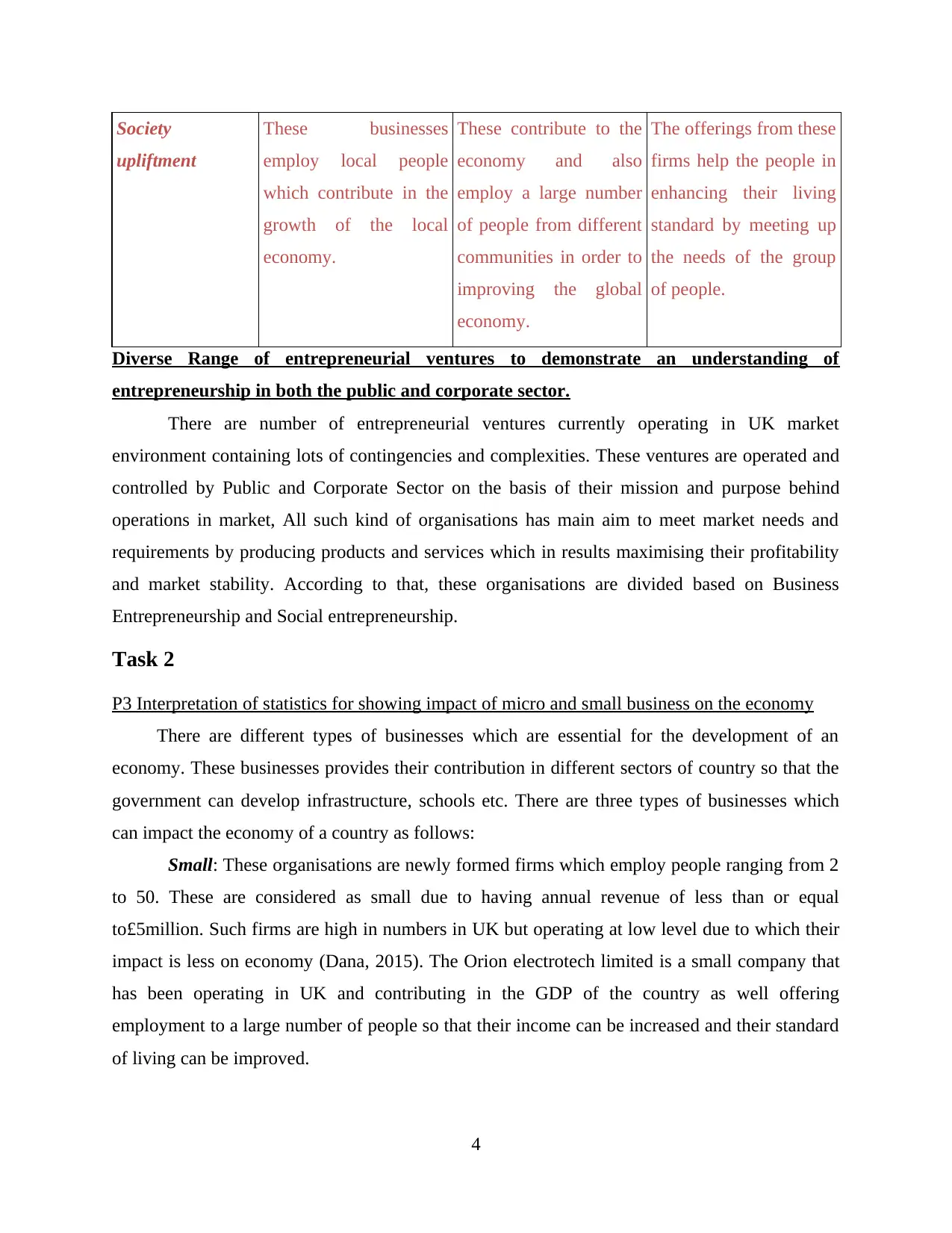
Society
upliftment
These businesses
employ local people
which contribute in the
growth of the local
economy.
These contribute to the
economy and also
employ a large number
of people from different
communities in order to
improving the global
economy.
The offerings from these
firms help the people in
enhancing their living
standard by meeting up
the needs of the group
of people.
Diverse Range of entrepreneurial ventures to demonstrate an understanding of
entrepreneurship in both the public and corporate sector.
There are number of entrepreneurial ventures currently operating in UK market
environment containing lots of contingencies and complexities. These ventures are operated and
controlled by Public and Corporate Sector on the basis of their mission and purpose behind
operations in market, All such kind of organisations has main aim to meet market needs and
requirements by producing products and services which in results maximising their profitability
and market stability. According to that, these organisations are divided based on Business
Entrepreneurship and Social entrepreneurship.
Task 2
P3 Interpretation of statistics for showing impact of micro and small business on the economy
There are different types of businesses which are essential for the development of an
economy. These businesses provides their contribution in different sectors of country so that the
government can develop infrastructure, schools etc. There are three types of businesses which
can impact the economy of a country as follows:
Small: These organisations are newly formed firms which employ people ranging from 2
to 50. These are considered as small due to having annual revenue of less than or equal
to£5million. Such firms are high in numbers in UK but operating at low level due to which their
impact is less on economy (Dana, 2015). The Orion electrotech limited is a small company that
has been operating in UK and contributing in the GDP of the country as well offering
employment to a large number of people so that their income can be increased and their standard
of living can be improved.
4
upliftment
These businesses
employ local people
which contribute in the
growth of the local
economy.
These contribute to the
economy and also
employ a large number
of people from different
communities in order to
improving the global
economy.
The offerings from these
firms help the people in
enhancing their living
standard by meeting up
the needs of the group
of people.
Diverse Range of entrepreneurial ventures to demonstrate an understanding of
entrepreneurship in both the public and corporate sector.
There are number of entrepreneurial ventures currently operating in UK market
environment containing lots of contingencies and complexities. These ventures are operated and
controlled by Public and Corporate Sector on the basis of their mission and purpose behind
operations in market, All such kind of organisations has main aim to meet market needs and
requirements by producing products and services which in results maximising their profitability
and market stability. According to that, these organisations are divided based on Business
Entrepreneurship and Social entrepreneurship.
Task 2
P3 Interpretation of statistics for showing impact of micro and small business on the economy
There are different types of businesses which are essential for the development of an
economy. These businesses provides their contribution in different sectors of country so that the
government can develop infrastructure, schools etc. There are three types of businesses which
can impact the economy of a country as follows:
Small: These organisations are newly formed firms which employ people ranging from 2
to 50. These are considered as small due to having annual revenue of less than or equal
to£5million. Such firms are high in numbers in UK but operating at low level due to which their
impact is less on economy (Dana, 2015). The Orion electrotech limited is a small company that
has been operating in UK and contributing in the GDP of the country as well offering
employment to a large number of people so that their income can be increased and their standard
of living can be improved.
4
Paraphrase This Document
Need a fresh take? Get an instant paraphrase of this document with our AI Paraphraser
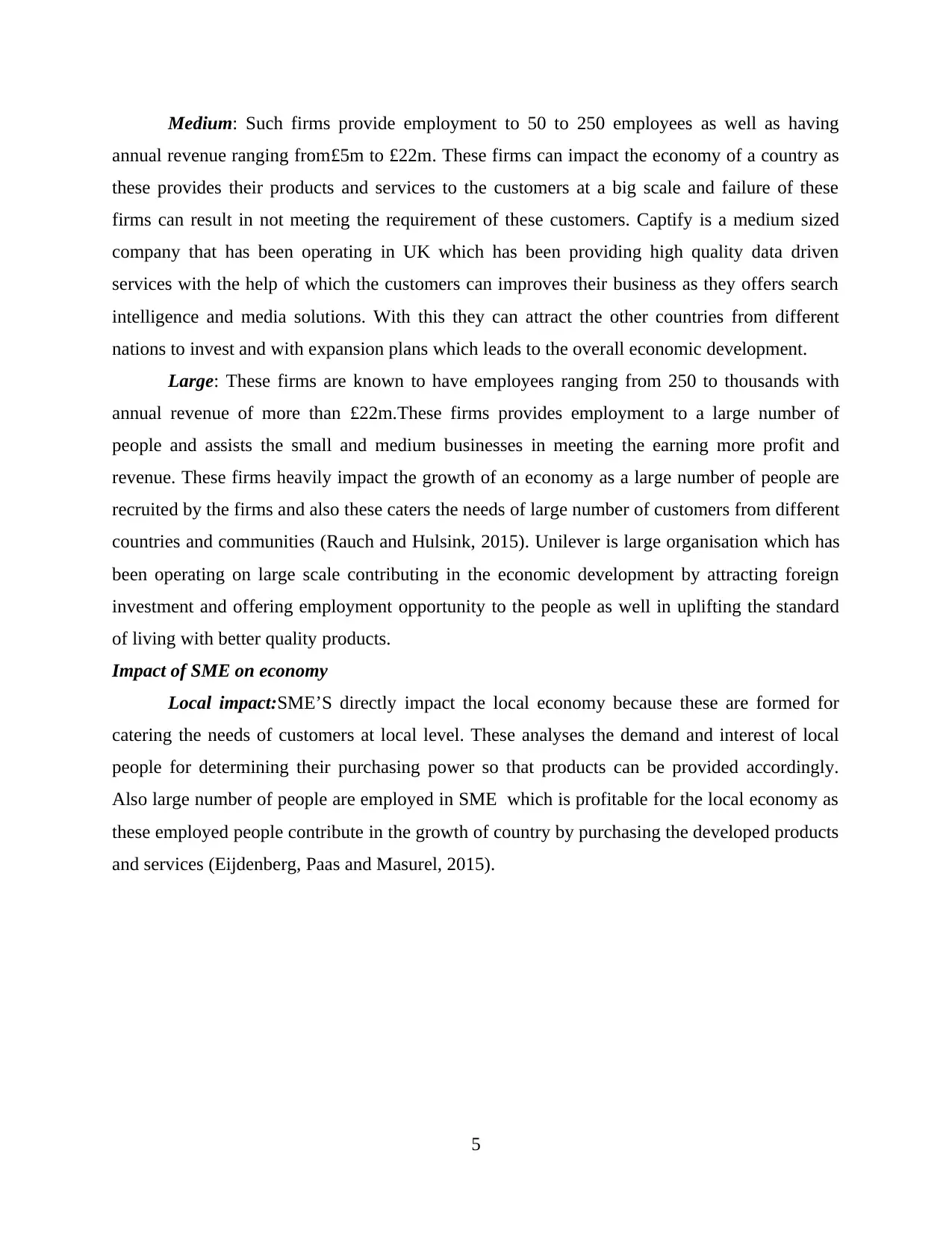
Medium: Such firms provide employment to 50 to 250 employees as well as having
annual revenue ranging from£5m to £22m. These firms can impact the economy of a country as
these provides their products and services to the customers at a big scale and failure of these
firms can result in not meeting the requirement of these customers. Captify is a medium sized
company that has been operating in UK which has been providing high quality data driven
services with the help of which the customers can improves their business as they offers search
intelligence and media solutions. With this they can attract the other countries from different
nations to invest and with expansion plans which leads to the overall economic development.
Large: These firms are known to have employees ranging from 250 to thousands with
annual revenue of more than £22m.These firms provides employment to a large number of
people and assists the small and medium businesses in meeting the earning more profit and
revenue. These firms heavily impact the growth of an economy as a large number of people are
recruited by the firms and also these caters the needs of large number of customers from different
countries and communities (Rauch and Hulsink, 2015). Unilever is large organisation which has
been operating on large scale contributing in the economic development by attracting foreign
investment and offering employment opportunity to the people as well in uplifting the standard
of living with better quality products.
Impact of SME on economy
Local impact:SME’S directly impact the local economy because these are formed for
catering the needs of customers at local level. These analyses the demand and interest of local
people for determining their purchasing power so that products can be provided accordingly.
Also large number of people are employed in SME which is profitable for the local economy as
these employed people contribute in the growth of country by purchasing the developed products
and services (Eijdenberg, Paas and Masurel, 2015).
5
annual revenue ranging from£5m to £22m. These firms can impact the economy of a country as
these provides their products and services to the customers at a big scale and failure of these
firms can result in not meeting the requirement of these customers. Captify is a medium sized
company that has been operating in UK which has been providing high quality data driven
services with the help of which the customers can improves their business as they offers search
intelligence and media solutions. With this they can attract the other countries from different
nations to invest and with expansion plans which leads to the overall economic development.
Large: These firms are known to have employees ranging from 250 to thousands with
annual revenue of more than £22m.These firms provides employment to a large number of
people and assists the small and medium businesses in meeting the earning more profit and
revenue. These firms heavily impact the growth of an economy as a large number of people are
recruited by the firms and also these caters the needs of large number of customers from different
countries and communities (Rauch and Hulsink, 2015). Unilever is large organisation which has
been operating on large scale contributing in the economic development by attracting foreign
investment and offering employment opportunity to the people as well in uplifting the standard
of living with better quality products.
Impact of SME on economy
Local impact:SME’S directly impact the local economy because these are formed for
catering the needs of customers at local level. These analyses the demand and interest of local
people for determining their purchasing power so that products can be provided accordingly.
Also large number of people are employed in SME which is profitable for the local economy as
these employed people contribute in the growth of country by purchasing the developed products
and services (Eijdenberg, Paas and Masurel, 2015).
5
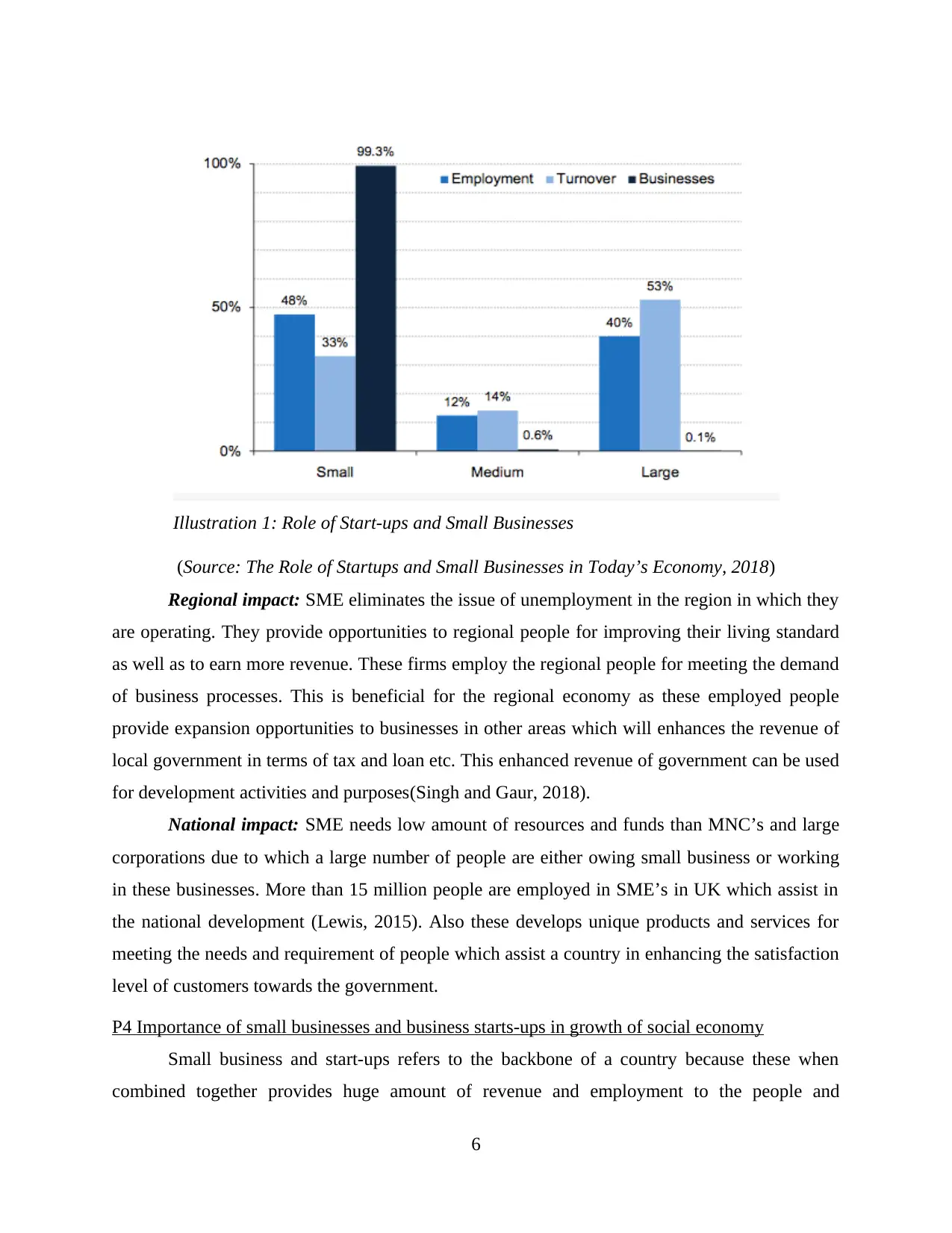
(Source: The Role of Startups and Small Businesses in Today’s Economy, 2018)
Regional impact: SME eliminates the issue of unemployment in the region in which they
are operating. They provide opportunities to regional people for improving their living standard
as well as to earn more revenue. These firms employ the regional people for meeting the demand
of business processes. This is beneficial for the regional economy as these employed people
provide expansion opportunities to businesses in other areas which will enhances the revenue of
local government in terms of tax and loan etc. This enhanced revenue of government can be used
for development activities and purposes(Singh and Gaur, 2018).
National impact: SME needs low amount of resources and funds than MNC’s and large
corporations due to which a large number of people are either owing small business or working
in these businesses. More than 15 million people are employed in SME’s in UK which assist in
the national development (Lewis, 2015). Also these develops unique products and services for
meeting the needs and requirement of people which assist a country in enhancing the satisfaction
level of customers towards the government.
P4 Importance of small businesses and business starts-ups in growth of social economy
Small business and start-ups refers to the backbone of a country because these when
combined together provides huge amount of revenue and employment to the people and
6
Illustration 1: Role of Start-ups and Small Businesses
Regional impact: SME eliminates the issue of unemployment in the region in which they
are operating. They provide opportunities to regional people for improving their living standard
as well as to earn more revenue. These firms employ the regional people for meeting the demand
of business processes. This is beneficial for the regional economy as these employed people
provide expansion opportunities to businesses in other areas which will enhances the revenue of
local government in terms of tax and loan etc. This enhanced revenue of government can be used
for development activities and purposes(Singh and Gaur, 2018).
National impact: SME needs low amount of resources and funds than MNC’s and large
corporations due to which a large number of people are either owing small business or working
in these businesses. More than 15 million people are employed in SME’s in UK which assist in
the national development (Lewis, 2015). Also these develops unique products and services for
meeting the needs and requirement of people which assist a country in enhancing the satisfaction
level of customers towards the government.
P4 Importance of small businesses and business starts-ups in growth of social economy
Small business and start-ups refers to the backbone of a country because these when
combined together provides huge amount of revenue and employment to the people and
6
Illustration 1: Role of Start-ups and Small Businesses
⊘ This is a preview!⊘
Do you want full access?
Subscribe today to unlock all pages.

Trusted by 1+ million students worldwide
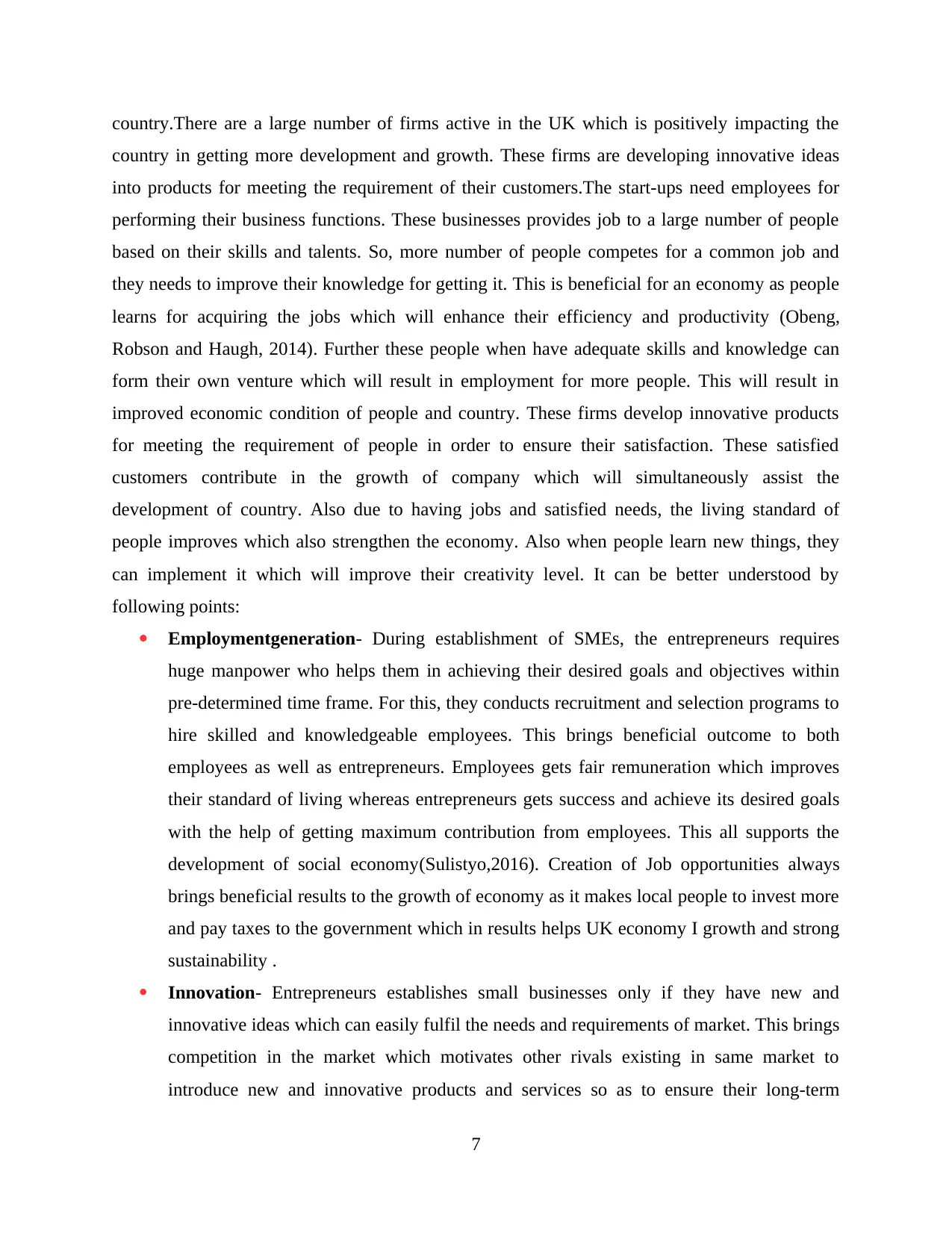
country.There are a large number of firms active in the UK which is positively impacting the
country in getting more development and growth. These firms are developing innovative ideas
into products for meeting the requirement of their customers.The start-ups need employees for
performing their business functions. These businesses provides job to a large number of people
based on their skills and talents. So, more number of people competes for a common job and
they needs to improve their knowledge for getting it. This is beneficial for an economy as people
learns for acquiring the jobs which will enhance their efficiency and productivity (Obeng,
Robson and Haugh, 2014). Further these people when have adequate skills and knowledge can
form their own venture which will result in employment for more people. This will result in
improved economic condition of people and country. These firms develop innovative products
for meeting the requirement of people in order to ensure their satisfaction. These satisfied
customers contribute in the growth of company which will simultaneously assist the
development of country. Also due to having jobs and satisfied needs, the living standard of
people improves which also strengthen the economy. Also when people learn new things, they
can implement it which will improve their creativity level. It can be better understood by
following points:
Employmentgeneration- During establishment of SMEs, the entrepreneurs requires
huge manpower who helps them in achieving their desired goals and objectives within
pre-determined time frame. For this, they conducts recruitment and selection programs to
hire skilled and knowledgeable employees. This brings beneficial outcome to both
employees as well as entrepreneurs. Employees gets fair remuneration which improves
their standard of living whereas entrepreneurs gets success and achieve its desired goals
with the help of getting maximum contribution from employees. This all supports the
development of social economy(Sulistyo,2016). Creation of Job opportunities always
brings beneficial results to the growth of economy as it makes local people to invest more
and pay taxes to the government which in results helps UK economy I growth and strong
sustainability .
Innovation- Entrepreneurs establishes small businesses only if they have new and
innovative ideas which can easily fulfil the needs and requirements of market. This brings
competition in the market which motivates other rivals existing in same market to
introduce new and innovative products and services so as to ensure their long-term
7
country in getting more development and growth. These firms are developing innovative ideas
into products for meeting the requirement of their customers.The start-ups need employees for
performing their business functions. These businesses provides job to a large number of people
based on their skills and talents. So, more number of people competes for a common job and
they needs to improve their knowledge for getting it. This is beneficial for an economy as people
learns for acquiring the jobs which will enhance their efficiency and productivity (Obeng,
Robson and Haugh, 2014). Further these people when have adequate skills and knowledge can
form their own venture which will result in employment for more people. This will result in
improved economic condition of people and country. These firms develop innovative products
for meeting the requirement of people in order to ensure their satisfaction. These satisfied
customers contribute in the growth of company which will simultaneously assist the
development of country. Also due to having jobs and satisfied needs, the living standard of
people improves which also strengthen the economy. Also when people learn new things, they
can implement it which will improve their creativity level. It can be better understood by
following points:
Employmentgeneration- During establishment of SMEs, the entrepreneurs requires
huge manpower who helps them in achieving their desired goals and objectives within
pre-determined time frame. For this, they conducts recruitment and selection programs to
hire skilled and knowledgeable employees. This brings beneficial outcome to both
employees as well as entrepreneurs. Employees gets fair remuneration which improves
their standard of living whereas entrepreneurs gets success and achieve its desired goals
with the help of getting maximum contribution from employees. This all supports the
development of social economy(Sulistyo,2016). Creation of Job opportunities always
brings beneficial results to the growth of economy as it makes local people to invest more
and pay taxes to the government which in results helps UK economy I growth and strong
sustainability .
Innovation- Entrepreneurs establishes small businesses only if they have new and
innovative ideas which can easily fulfil the needs and requirements of market. This brings
competition in the market which motivates other rivals existing in same market to
introduce new and innovative products and services so as to ensure their long-term
7
Paraphrase This Document
Need a fresh take? Get an instant paraphrase of this document with our AI Paraphraser
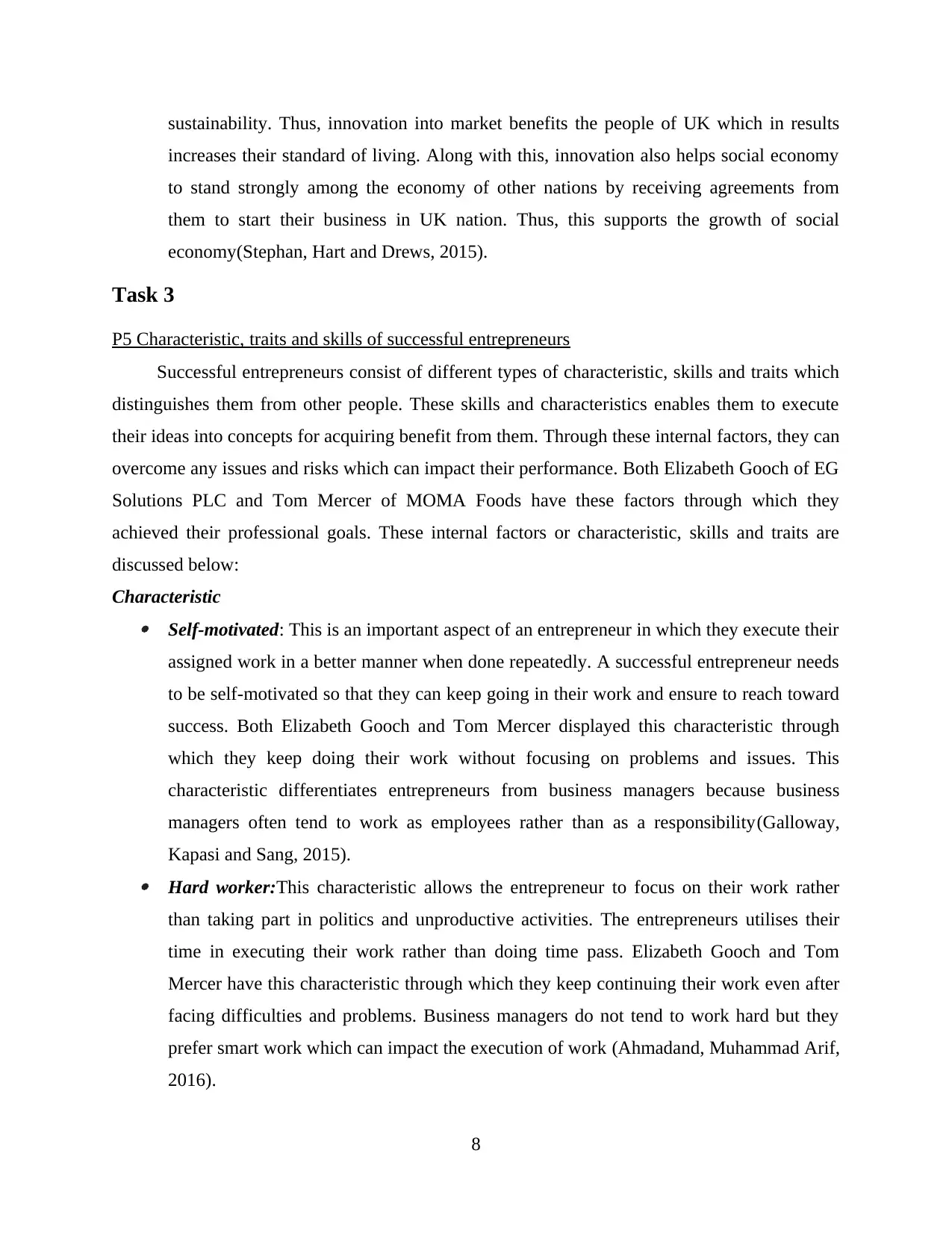
sustainability. Thus, innovation into market benefits the people of UK which in results
increases their standard of living. Along with this, innovation also helps social economy
to stand strongly among the economy of other nations by receiving agreements from
them to start their business in UK nation. Thus, this supports the growth of social
economy(Stephan, Hart and Drews, 2015).
Task 3
P5 Characteristic, traits and skills of successful entrepreneurs
Successful entrepreneurs consist of different types of characteristic, skills and traits which
distinguishes them from other people. These skills and characteristics enables them to execute
their ideas into concepts for acquiring benefit from them. Through these internal factors, they can
overcome any issues and risks which can impact their performance. Both Elizabeth Gooch of EG
Solutions PLC and Tom Mercer of MOMA Foods have these factors through which they
achieved their professional goals. These internal factors or characteristic, skills and traits are
discussed below:
Characteristic Self-motivated: This is an important aspect of an entrepreneur in which they execute their
assigned work in a better manner when done repeatedly. A successful entrepreneur needs
to be self-motivated so that they can keep going in their work and ensure to reach toward
success. Both Elizabeth Gooch and Tom Mercer displayed this characteristic through
which they keep doing their work without focusing on problems and issues. This
characteristic differentiates entrepreneurs from business managers because business
managers often tend to work as employees rather than as a responsibility(Galloway,
Kapasi and Sang, 2015). Hard worker:This characteristic allows the entrepreneur to focus on their work rather
than taking part in politics and unproductive activities. The entrepreneurs utilises their
time in executing their work rather than doing time pass. Elizabeth Gooch and Tom
Mercer have this characteristic through which they keep continuing their work even after
facing difficulties and problems. Business managers do not tend to work hard but they
prefer smart work which can impact the execution of work (Ahmadand, Muhammad Arif,
2016).
8
increases their standard of living. Along with this, innovation also helps social economy
to stand strongly among the economy of other nations by receiving agreements from
them to start their business in UK nation. Thus, this supports the growth of social
economy(Stephan, Hart and Drews, 2015).
Task 3
P5 Characteristic, traits and skills of successful entrepreneurs
Successful entrepreneurs consist of different types of characteristic, skills and traits which
distinguishes them from other people. These skills and characteristics enables them to execute
their ideas into concepts for acquiring benefit from them. Through these internal factors, they can
overcome any issues and risks which can impact their performance. Both Elizabeth Gooch of EG
Solutions PLC and Tom Mercer of MOMA Foods have these factors through which they
achieved their professional goals. These internal factors or characteristic, skills and traits are
discussed below:
Characteristic Self-motivated: This is an important aspect of an entrepreneur in which they execute their
assigned work in a better manner when done repeatedly. A successful entrepreneur needs
to be self-motivated so that they can keep going in their work and ensure to reach toward
success. Both Elizabeth Gooch and Tom Mercer displayed this characteristic through
which they keep doing their work without focusing on problems and issues. This
characteristic differentiates entrepreneurs from business managers because business
managers often tend to work as employees rather than as a responsibility(Galloway,
Kapasi and Sang, 2015). Hard worker:This characteristic allows the entrepreneur to focus on their work rather
than taking part in politics and unproductive activities. The entrepreneurs utilises their
time in executing their work rather than doing time pass. Elizabeth Gooch and Tom
Mercer have this characteristic through which they keep continuing their work even after
facing difficulties and problems. Business managers do not tend to work hard but they
prefer smart work which can impact the execution of work (Ahmadand, Muhammad Arif,
2016).
8
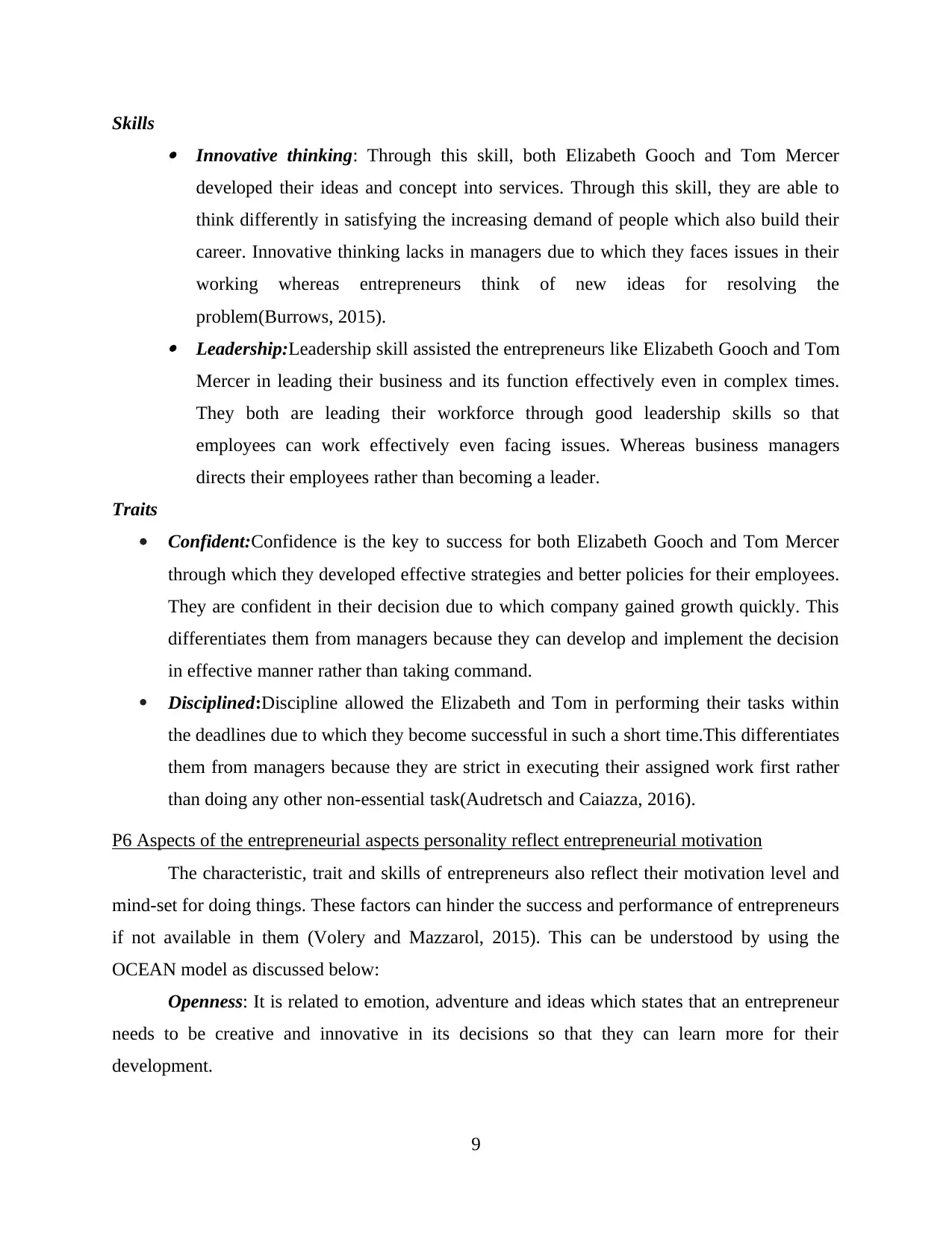
Skills Innovative thinking: Through this skill, both Elizabeth Gooch and Tom Mercer
developed their ideas and concept into services. Through this skill, they are able to
think differently in satisfying the increasing demand of people which also build their
career. Innovative thinking lacks in managers due to which they faces issues in their
working whereas entrepreneurs think of new ideas for resolving the
problem(Burrows, 2015).
Leadership:Leadership skill assisted the entrepreneurs like Elizabeth Gooch and Tom
Mercer in leading their business and its function effectively even in complex times.
They both are leading their workforce through good leadership skills so that
employees can work effectively even facing issues. Whereas business managers
directs their employees rather than becoming a leader.
Traits
Confident:Confidence is the key to success for both Elizabeth Gooch and Tom Mercer
through which they developed effective strategies and better policies for their employees.
They are confident in their decision due to which company gained growth quickly. This
differentiates them from managers because they can develop and implement the decision
in effective manner rather than taking command.
Disciplined:Discipline allowed the Elizabeth and Tom in performing their tasks within
the deadlines due to which they become successful in such a short time.This differentiates
them from managers because they are strict in executing their assigned work first rather
than doing any other non-essential task(Audretsch and Caiazza, 2016).
P6 Aspects of the entrepreneurial aspects personality reflect entrepreneurial motivation
The characteristic, trait and skills of entrepreneurs also reflect their motivation level and
mind-set for doing things. These factors can hinder the success and performance of entrepreneurs
if not available in them (Volery and Mazzarol, 2015). This can be understood by using the
OCEAN model as discussed below:
Openness: It is related to emotion, adventure and ideas which states that an entrepreneur
needs to be creative and innovative in its decisions so that they can learn more for their
development.
9
developed their ideas and concept into services. Through this skill, they are able to
think differently in satisfying the increasing demand of people which also build their
career. Innovative thinking lacks in managers due to which they faces issues in their
working whereas entrepreneurs think of new ideas for resolving the
problem(Burrows, 2015).
Leadership:Leadership skill assisted the entrepreneurs like Elizabeth Gooch and Tom
Mercer in leading their business and its function effectively even in complex times.
They both are leading their workforce through good leadership skills so that
employees can work effectively even facing issues. Whereas business managers
directs their employees rather than becoming a leader.
Traits
Confident:Confidence is the key to success for both Elizabeth Gooch and Tom Mercer
through which they developed effective strategies and better policies for their employees.
They are confident in their decision due to which company gained growth quickly. This
differentiates them from managers because they can develop and implement the decision
in effective manner rather than taking command.
Disciplined:Discipline allowed the Elizabeth and Tom in performing their tasks within
the deadlines due to which they become successful in such a short time.This differentiates
them from managers because they are strict in executing their assigned work first rather
than doing any other non-essential task(Audretsch and Caiazza, 2016).
P6 Aspects of the entrepreneurial aspects personality reflect entrepreneurial motivation
The characteristic, trait and skills of entrepreneurs also reflect their motivation level and
mind-set for doing things. These factors can hinder the success and performance of entrepreneurs
if not available in them (Volery and Mazzarol, 2015). This can be understood by using the
OCEAN model as discussed below:
Openness: It is related to emotion, adventure and ideas which states that an entrepreneur
needs to be creative and innovative in its decisions so that they can learn more for their
development.
9
⊘ This is a preview!⊘
Do you want full access?
Subscribe today to unlock all pages.

Trusted by 1+ million students worldwide
1 out of 17
Related Documents
Your All-in-One AI-Powered Toolkit for Academic Success.
+13062052269
info@desklib.com
Available 24*7 on WhatsApp / Email
![[object Object]](/_next/static/media/star-bottom.7253800d.svg)
Unlock your academic potential
Copyright © 2020–2025 A2Z Services. All Rights Reserved. Developed and managed by ZUCOL.



